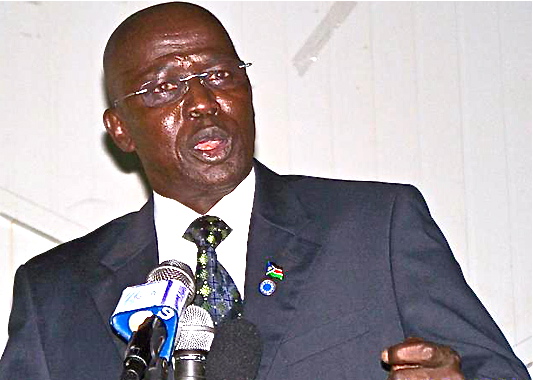Malakal not in rebel hands says Upper Nile governor
December 25, 2013 (JUBA) – South Sudan’s government said on Wednesday that troops loyal to its administration remain in control of much of Upper Nile, the country’s second largest oil-producing state.

The SPLA said that they has retaken Bor on Tuesday after mutineers led by General Peter Gadet took control of the Jonglei state capital last week.
“Much of the Upper Nile state remains under the government. Yes, there has been a fighting since Tuesday but the SPLA forces have been able to quickly flash out those attempting to destabilize security situation”, Simon Kun Puoc, Upper Nile’s governor of the area told Sudan Tribune on Wednesday.
Puoc did not disclose where he was speaking from. Sources close to him claim he fled to Paloch, an area with airstrip within the territorial jurisdiction of Melut county, which is located between Renk and Malakal.
Ateny Wek Ateny, the spokesperson of South Sudan’s president told Sudan Tribune that Upper Nile state has experienced fighting between armed elements aligned to Machar and those loyal to the government led by President Salva Kiir .
“Yes there has been a heavy fighting in Malakal and the surroundings between the forces loyal to Dr. Riek Machar and the government since Tuesday but the town remains under the control of forces loyal to the government as I speak to you”, Ateny said.
The official denied that fighting had interrupted the production and flow of oil to international markets through the territory of the neigbouring Sudan.
“The oil fields are safe. There is no problem. They are under control”, he said.
But sources close to the armed opposition claimed in series of interviews with Sudan Tribune said that the town had since Tuesday evening has been controlled by rebels.
“Malakal is now under the control of the forces opposed to the treatment our people had experienced in Juba. Who would believe that president Salva Kiir would turn [into] a tribal leader,” a government official in Malakal told Sudan Tribune.
The elements of the army who defected say their main grievances are the reports of civilians being targeted on the basis of their tribe during last week’s violence in Juba.
After fighting broke out between members of the Presidential Guard on 15 December President Kiir accused his former deputy Machar and others of being behind a coup attempt. Allegations denied by all the accused, most of whom have been detained for over a week.
Although the power struggle that led to the fighting was political much of the violence that has followed has been along tribal lines.
“Actually the SPLA commanders who have now switched sides acted so because their family members and even their own wives were killed in the Juba incident” the official, who did not want to be named, told Sudan Tribune from Malakal town on Wednesday.
Most of the confirmed incidents of violence have been in the capital. But there have also been serious incidents in Jonglei, Unity and Upper Nile states.
Some of the violence has been in the form of revenge attacks against member of the Dinka ethnic group, South Sudan’s largest after Dinka soldiers were accused of attacking Nuer civilians in Juba.
“What happened in Juba is unbelievable” the government source in Malakal said.
An official with the United Nations office in Malakal also confirmed that fighting broke out in the area on Tuesday and resumed on Wednesday after subsiding on Tuesday night.
“There has been a heavy fighting here in Malakal since Tuesday morning. We now have people who fled the town to our camp. They have been here since Tuesday morning.
The town is under the control of the forces who do not want the government but forces loyal to the government remain in control of the airport”, he told Sudan Tribune on Wednesday.
(ST)
Read all Sudan Tribune‘s coverage of the crisis in South Sudan here:
The latest tweets on the crisis in South Sudan:
